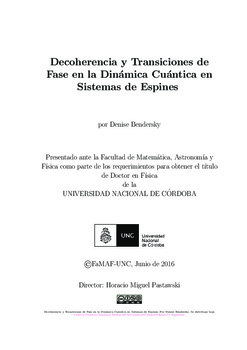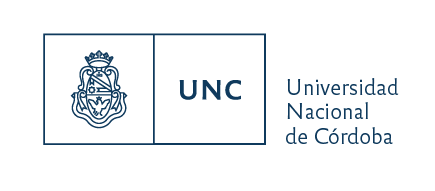| dc.contributor.advisor | Pastawski, Horacio Miguel | |
| dc.contributor.author | Bendersky, Denise | |
| dc.date.accessioned | 2016-08-22T15:57:40Z | |
| dc.date.available | 2016-08-22T15:57:40Z | |
| dc.date.issued | 2016-06 | |
| dc.identifier.uri | http://hdl.handle.net/11086/3374 | |
| dc.description | Tesis (Doctor en Física)--Universidad Nacional de Córdoba. Facultad de Matemática, Astronomía, Física y Computación, 2016. | es |
| dc.description.abstract | Tal como establece la Segunda Ley de la Termodinámica, los eventos que ocurren en la Naturaleza son esencialmente irreversibles. Mediante técnicas de Resonancia Magnética Nuclear, es posible revertir una dinámica cuántica difusiva en un sistema de espines. La probabilidad de retornar al estado inicial luego de la reversión se denomina Eco de Loschmidt (LE). Su evaluación permite cuantificar la decoherencia, y por consiguiente, la irreversibilidad, y constituye el eje central de esta tesis. Su observación en sistemas de espines sugiere la existencia de un régimen en el que el LE se degrada independientemente de las perturbaciones (PID), que podría tratarse de una propiedad emergente en el limite termodinámico bajo la forma de una Transición de Fase en la Dinámica Cuántica (QDPT).
En este trabajo hemos desarrollado y empleado métodos numéricos y analíticos para evaluar el LE en modelos de diversa complejidad, donde podría tener lugar una QDPT. Así, evaluamos las QDPT en el modelo D'Amato-Pastawski para un doble punto cuántico acoplado a un ambiente. Además, hemos estudiado cómo la dinámica coherente de un estado complejo se degrada en presencia de un ambiente simple. Luego, con el propósito de establecer un vínculo más concreto con sistemas experimentales, evaluamos el LE en sistemas de espines, precisamente para buscar mecanismos emergentes en el límite termodinámico. Finalmente, desarrollamos una nueva herramienta que podría resultar de suma utilidad para evitar las limitaciones que aparecen al evaluar numéricamente la dinámica de un estado mezcla, basada en el paralelismo cuántico. | es |
| dc.description.abstract | The Second Law of Thermodynamics states that events that occur in Nature are essentially irreversible. This thesis constitutes a contribution to the understanding of the mechanisms that lead to irreversibility. Nuclear Magnetic Resonance offers the opportunity to time-reverse the diffusive quantum dynamics in a spin system by changing the sign of its Hamiltonian. The Loschmidt Echo (LE) provides a measure of the revival occurring when an imperfect time-reversal procedure is applied to a complex quantum system. The LE allows to quantify the destruction of quantum coherence –or decoherence–, and thus, irreversibility. There is experimental evidence in spin systems that suggests the existence of a perturbation independent decay (PID). This PID could be an emergent phenomena in the thermodynamic limit (TL), in the form of a Quantum Dynamical Phase Transition (QDPT).
In this work we developed numerical and analytical methods to evaluate deco-herence in models of different complexity, in which a QDPT could take place. We studied a QDPT in the D’amato-Pastawski model for a double quantum dot. Besides, we address how the coherent dynamics of a harmonic oscillator degrades in the presence of a two level system playing the role of the environment. Additionally, we evaluated the LE in spin systems in order to find emergent mechanisms in the TL. In this cases, the link with experimental systems is more natural. Finally, we developed a new tool that could be very useful to avoid the limitations that appear to numerically evaluate the dynamics of a mixed state, based on the quantum parallelism. | en |
| dc.language.iso | spa | es |
| dc.rights | Atribución-NoComercial-CompartirIgual 2.5 Argentina | * |
| dc.rights.uri | http://creativecommons.org/licenses/by-nc-sa/2.5/ar/ | * |
| dc.subject | Decoherencia. Sistemas abiertos; Métodos estadísticos cuantitativos | es |
| dc.subject | Decoherence. Open systems; quantum statistical methods | es |
| dc.subject | Transport processes | es |
| dc.subject | Nonequilibrium and irreversible thermodynamics | es |
| dc.subject | Spin chains models | es |
| dc.subject.other | Eco de Loschmidt | |
| dc.subject.other | Límite termodinámico | |
| dc.subject.other | Regla de oro de Fermi | |
| dc.subject.other | Irreversibilidad | |
| dc.title | Decoherencia y transiciones de fase en la dinámica cuántica en sistemas de espines | es |
| dc.type | doctoralThesis | es |





